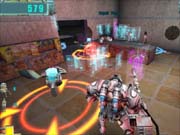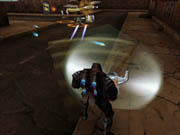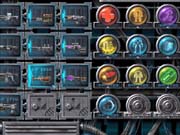X-COM: Enforcer is a pure arcade action game featuring more than 30 levels of nonstop shooting. You play as the enforcer, a humanoid robot exclusively designed to kill the hundreds of invading creatures found in each level. If you're familiar with the X-COM series--the original X-COM: UFO Defense from 1993 is widely recognized as one of the finest turn-based strategy games of all time--the simple action in X-COM: Enforcer might come as a real shock. Indeed, for die-hard fans of the X-COM strategy games, Enforcer is a travesty: It flagrantly abandons all of the suspenseful, tactical combat that made X-COM popular in the first place. In fact, aside from the "X-COM" in the title, and a generically similar premise of having to protect the earth from alien conquest, Enforcer is completely unrelated to its predecessors. This is unfortunate for X-COM fans, and actually, it's also too bad for X-COM: Enforcer. On its own terms, Enforcer is a fast-paced and rather fun shooter, though it'll prove too easy for veteran players.

If you're more experienced with action games than with strategy games, you'll be able to get into Enforcer immediately. The controls are extremely simple: You can run and jump in any direction, and you can shoot. All of this is easily accomplished using the mouse to steer and fire and the keyboard to run. Unlike in most recent shooters, you don't ever have to aim up or down in Enforcer. In the rare instances when your target isn't directly ahead of you, your character will actually aim up or down for you. Though there is an optional mouselook feature in the game, enabling it merely makes the controls more cumbersome than they are otherwise.
You can carry only one weapon at a time. Your default machine gun isn't really suitable for fending off the dozens of foes you'll be up against at virtually every moment in the game. Fortunately, more powerful weapons spawn into the area constantly, most all of which are great for killing packs of foes quickly and effortlessly. As you eliminate your foes, they drop spinning "data point" tokens, which you must collect before they disappear. These data points can be spent in between levels, either to unlock new weapons and power-ups or to augment those weapons and power-ups already available, and also to improve your character's basic attributes. Spending your data points is meant to be similar to the research-and-development systems from previous X-COM games, in which you'd reverse-engineer and then reapply the alien technology you discovered during skirmishes. Needless to say it's not nearly as involved in Enforcer, though as you progress through the game, you do get to pick and choose from a lot of different upgrade options. However, you'll soon realize that some of these options are much more valuable than others are, and later in the game, you'll have maxed out most of your upgrades anyway. Still, buying better weapons and power-ups can be a nice, quick change of pace from the hectic missions.

Enforcer has more than 30 levels, almost all of which are virtually identical in that you must simply run from point to point, killing aliens and destroying the little teleporters that keep spawning them in. The aliens get bigger as you proceed through the game, but then again your guns get much stronger, and in the end, these factors balance each other out. Some levels also make you rescue a certain number of civilians, who stand around waiting for you helplessly (though they're actually immune to harm). The game pits you against a few forgettable boss monsters, and there's exactly one mission that makes you defend an area from alien attack for a couple of minutes. This sequence, which is relatively early in the game, is also relatively tough; you'll be glad when it's over.
Thirty levels sounds like a lot, but you could probably finish all of X-COM: Enforcer in a single sitting. This is partly because the levels don't waste any time; you usually start right at the brink of a firefight, and the fighting doesn't stop until you've destroyed all of the teleporters and completed the level. The design of the levels is very basic--there's very little exploration required, and you usually can't go on to the next area of a level without clearing out the area you're in. For those occasions when you can't easily find the next teleporter or civilian, a flashing blue arrow intermittently points in the general direction of your target, which helps put you back on track and keeps the pacing of the game steady. Most of the levels have a few hidden secrets. The majority of the levels have five floating icons that spell the word "bonus" hidden away in nooks and crannies (usually behind destructible walls), and if you collect all of these, you get whisked away to a bonus stage upon completion of the level. These bonus stages give you a chance to earn more data points under a time constraint. Besides bonus icons, many levels also have a hidden alien artifact that you can find. These unlock new research items, either a weapon or a power-up. They're actually a good incentive, as you'll want to finish the mission you're in to find out what the object is; and you'll want to play the next mission to find out how it works.
Because most of the weapons in Enforcer are extremely powerful once you upgrade them, and because the levels are all quick and straightforward, the game is actually quite addictive. Though it uses the Unreal Tournament 3D graphics engine, X-COM: Enforcer actually has little of the depth or complexity found in that game--or any other good first-person shooter. Instead, the breakneck pacing of the game and the pure, relentless action are more similar to arcade classics such as Robotron 2084 and its spiritual successor, Smash TV. Enforcer even throws in a few self-conscious references to these games.

People still remember Robotron 2084 and SmashTV because they were extremely challenging. For all its similarity to games like these, X-COM: Enforcer has absolutely none of their difficulty. The enforcer was apparently designed all too well to perform his only directive. Most of his alien foes are powerless against his arsenal of weapons, at least when the weapons are upgraded. These include the mass-driver, which is so strong that its rapid-fire wide-area blast will pierce through everything in its path until it hits a wall; and the fusion cannon, which spews forth a fan of superheated death, usually killing everything onscreen instantly. Of further note, disappointed X-COM fans will find that this powerful arsenal actually has little in common with the weapons in any of the other X-COM games.
The highly dangerous weapons pose no threat to the enforcer himself, and for the most part, neither do his enemies, whose halfhearted attacks tend to cause superficial injuries that can be shrugged off. In addition, the commonly found repair kit power-up can be fully upgraded to heal an immense amount of damage. Oftentimes, while getting thrashed by a throng of enemies, you'll stumble upon a repair kit and suddenly you'll be as good as new. The game certainly gives the illusion of intense combat--but you'll quickly notice that you're rarely if ever in any real danger. This complete lack of challenge diminishes Enforcer's lasting value and will make it disappointing for those players who should've been its target audience in the first place--the Robotron and SmashTV veterans. Enforcer does offer three difficulty settings, but in actuality they're just three shades of easy.
Enforcer looks fairly good. The third-person perspective gives you a better sense of your periphery than you'd get in a first-person game, though it'll also make you notice the awkward animation of the main character. Fortunately, the weapon effects are big and flashy, and the game manages to throw a surprising number of enemies at you. Unfortunately, unlike the battles in the recent first-person shooter Serious Sam, whose proprietary engine was designed to push a lot of characters onscreen, the battles in X-COM: Enforcer can really bog down when there's a high number of things moving around at once. The game's fast techno soundtrack is catchy at first but gets repetitive, while the sound effects in the game are surprisingly subdued. Still, you'll probably come to appreciate how quiet most of the sounds are, since these too would undoubtedly start to grate on you if they were any louder.

Like Unreal Tournament, X-COM: Enforcer offers easy access to an online player-matching service from within the game, though Enforcer didn't get Unreal Tournament's instant popularity. Still, multiplayer Enforcer can be played either cooperatively or in a deathmatch mode. There aren't any team modes, and the simplistic style of the game doesn't lend itself particularly well to deathmatching, though the cooperative action can be enjoyable for a while. Multiplayer Enforcer takes place in the same exact areas as the single-player game, and the game ultimately isn't much different if you play alone or with someone else.
There've been other unsuccessful X-COM offshoots, including the space combat simulation X-COM: Interceptor and the simplistic play-by-email game X-COM: First Alien Invasion. But X-COM: Enforcer is the biggest departure from the core series to date. It's as mindless of a shooter as they come, and you can't help but be disappointed at the thought of this, in light of the series' roots as a mentally stimulating strategy game. That's not to say a mindless shooter is a bad thing. X-COM: Enforcer can certainly be fun, and it can be addictive in a manner that's at least slightly reminiscent of how X-COM: UFO Defense was. Of course you'll be done with Enforcer in a fraction of the time you could spend with the 1993 game. In the end, it's much more difficult to try to understand why X-COM: Enforcer was billed as such than it is to actually play all the way through it.